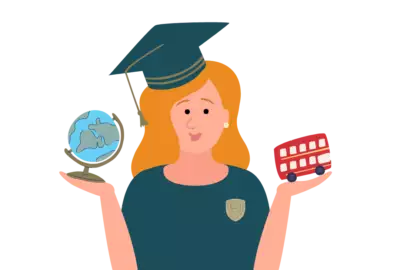Expert Insights
How to choose personal essay topics for U.S. university applications
Published 21st August 2019

With the release of the writing prompts for application essays for U.S. universities imminent, we thought we’d provide any students thinking of applying with some tips on how to choose compelling essay topics.
The personal essays are the most challenging part of the application process for university in the U.S., demanding creative and original responses that showcase the individuality of the student applying. Each university will provide a writing prompt for prospective students, who submit a creative personal writing piece of anywhere between 50-1,000 words (the limit depends on the university).
Whatever the given topic or prompt (examples from past years have been to discuss the importance of community, describe what motivates you, or explain an obstacle you faced), the essay should reflect your character, background, life experiences and ambitions, alongside being coherently and creatively written. Admissions staff aren’t looking for glorified CVs or résumés, and you want to avoid cliché.
A good starting point when thinking about your topic is to read some previous examples of successful essays. Tufts, Connecticut College and John Hopkins all have provided some sample successful essays online for you to read and get a sense of the possibilities.
There’s so much advice out there on these essays, so rather than stomping down all the usual avenues, here are three specific suggestions of steps you can take to decide on an essay topic that reflects you while avoiding being derivative.
Talk talk talk
Ultimately the application essay is about you, the applicant. Specifically, it’s about your motivations, your emotions, your background: what makes you unique, in other words. While your answer needs to cover the specific prompt provided to an extent, ultimately that prompt is just a means for the admissions team to get to know you.
Unfortunately, writing about yourself can be really hard, especially if you aspire to do it with authenticity and charm. This challenge is even greater if you’re applying after going through the British education system, where university applications are focused more on the specific academic subject you’re applying for than on your own personal journey, and where social mores are less encouraging of proud self-celebration. It can frankly feel a bit weird to write about yourself in this way if you’re not familiar with it.
A great way of overcoming this feeling, and to get a sense of the things that are genuinely fascinating about you, is to chat about yourself with someone you know. It’s better if this is a friend, or someone from school, and not a family member. Your family are far more likely to take for granted some of the aspects to your background or upbringing which to others are really different and interesting.
Ask them: what is the first thing you think about when you think about me? Or: what is the strongest memory you have of me? What do you think is the most unique thing about me? What about my background do you find noticeable (or even baffling)? Come up with your own questions too.
After the conversation, make notes on what they said (or you could even record the conversation, if they’re comfortable with it). Their answers are almost bound to be aspects of your life or incidents from your past that you wouldn’t have even thought about, and could be the starting point for really inspiring essays.
Or, if the conversation was particularly amusing, revealing, or emotional, it could even form the basis of a great essay in and of itself. An essay recounting an intimate conversation with a close friend, describing the process of you trying to understand yourself more, is a great hook. It also shows that you’re someone who interacts well with others and values viewpoints outside your own - essential traits for an undergraduate!
The magic in the everyday
As the examples linked above show, application essays don’t have to be about something particularly unusual to stand out; they don’t have to ripple with narrative ambition and cover the whole of your life-story in one short, sweeping piece.
Instead, think in microcosm. What small, everyday moments might reflect a wider truth about you and your experiences? Perhaps your walk to school - past people of different cultures, through neighbourhoods rich in history, stimulating memories and sensations that led you to the current moment - inspired your curiosity, excited your desire to discover the world? Maybe it is in your weekly visit to the swimming pool, submerged in water, where you reflect on philosophy and the nature of existence, that you will find your topic.
Don’t overlook the seemingly mundane areas of life - often they are anything but and instead have been your inspiration, your route to being you!
Some judicious juxtaposition
Finally, you might explore your contradictions. Often we’re at our most interesting when something doesn’t seem to make sense, everything isn’t as it seems, or there is an obvious contrast.
Sometimes these contrasts can be framed as a struggle: between your love of science but also your need to be artistically creative, for example. It might be a question of identity: your current beliefs don’t reflect your background despite growing out of them. Whatever it is, talk about it. Share it with the admissions team, explain how it means you’ll be a great fit at their university. Don’t pretend to know all the answers, or claim to have this problem entirely figured out, just own it and show how it’s part of you. Be willing to share these tensions even if they seem entirely personal.
By being self-aware of these complexities and highlighting them, not only will you show yourself to be a sensitive and self-reflective individual, you will come across as acknowledging the need for change and growth, that life isn’t full of simple decisions and straightforward journeys.
Think along your fault lines, and highlight the juxtapositions in your makeup.
Hopefully these suggestions will help you refine your ideas for your own application essay. Here at Ivy Education we can offer expert advice in preparing to apply for university in the U.S., particularly through our Careers & Universities Consultant, Oya Christie-Miller, who has been helping students apply for universities around the world since 2008.
Don’t hesitate to get in touch with us if you’d like to talk to us about applying to university in the U.S.










